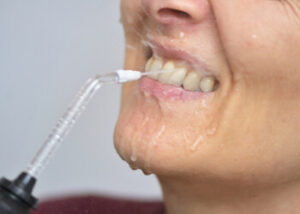Brushing and flossing twice a day gives you protection against cavities and tooth decay, but only if you know your brushing and flossing technique well enough to remove all traces of plaque from your teeth. A water flosser gives you the opportunity to improve your oral hygiene by making thorough cleaning of your teeth much easier. Let’s unpack water flosser effectiveness so you can decide if an oral irrigator will benefit your dental hygiene.
What Is A Water Flosser?
 Also known as a water pik or oral irrigator, a water flosser is a battery-operated device that can be used to remove plaque, debris and food from between your teeth and below your gum line. While there are different types of water flossers available on the market, their composition is more or less the same.
Also known as a water pik or oral irrigator, a water flosser is a battery-operated device that can be used to remove plaque, debris and food from between your teeth and below your gum line. While there are different types of water flossers available on the market, their composition is more or less the same.
Oral irrigators usually have a nozzle, water reservoir and a motor that provides power. Specialised oral irrigators include cordless, countertop, faucet flossers and shower flossers.
A water pik works by directing streams of water through the nozzle, to the spaces between your teeth. The pressure of the water removes debris, plaque, tartar and food that may be trapped between your teeth or below the gum line.
If you have ever found yourself avoiding string floss or struggled to use it, an oral irrigator could be beneficial.
How To Gauge Water Flosser Effectiveness?
While string floss is certainly effective when used properly, a water flosser is an effective addition to your dental hygiene routine if
You have gum sensitivity
String floss can be abrasive, especially to sensitive gums or if you suffer from gum disease. If string floss is used too aggressively it can cause a little bleeding from the gums. The water pressure from an oral irrigator will not irritate gums like string floss.
You have restorations or tooth replacements
Patients who have false teeth, dental implants, crowns or any restorations as a result of tooth decay can benefit from using water flossers. If you have lost teeth due to decay it could be a sign that your dental hygiene needs more care and attention.
You suffer from arthritis or carpal tunnel syndrome
If you have a condition that interferes with the dexterity of your hands or fingers, a water flosser could make the process much easier. Patients whose mobility is compromised may find it uncomfortable or painful to use string floss. Using an oral irrigator will ensure you can remove plaque from those hard-to-access areas in your mouth.
You have orthodontic braces
Wearing orthodontic braces requires you to take extra special care of your teeth. If you have crooked teeth it’s likely that you will already have small spaces in your mouth that your toothbrush cannot access. When you have braces, it’s important that you clean between the orthodontic wires and brackets, and that all your tooth surfaces are cleaned thoroughly. It is much more difficult to use string floss when you wear braces, and a water pik can do the job much more effectively.
You are serious about avoiding gum disease
Flossing is an essential part of your oral hygiene but it is neglected by so many patients. In order to protect your teeth and gums, flossing has to be done twice a day and it has to be done effectively. Water flosser effectiveness has been proven in various studies and shown to be as effective as string dental floss at removing plaque.
Water flossers have been shown to remove more plaque from periodontal pockets in patients who have gum disease and may help patients to avoid a worsening of periodontitis.
You have children to teach about oral hygiene
With flossing being such an important component of oral hygiene it’s understandable that parents have concerns about teaching their children the correct technique.
 Using a water flosser is an effective way to ensure that plaque is being removed from your child’s teeth while he or she learns.
Using a water flosser is an effective way to ensure that plaque is being removed from your child’s teeth while he or she learns.
It also makes a more positive and less stressful experience for the child who is learning. You can use the time to make the experience enjoyable and teach your child about caring for his or her teeth without the pressure of worrying whether the job is being done well enough.
You also don’t have to worry about gum abrasion or irritation and your child being put off flossing at a young age.
How To Use A Water Flosser For Maximum Effectiveness?
Of course, any technology is only as good as the person using it. Before using a water flosser, it’s a good idea to position yourself in front of a mirror and over a basin, at least for the first time using it.
Studies have shown that it doesn’t matter if you floss before or after brushing, what’s most important is that you do it twice a day, every day. Another benefit of an oral irrigator is that it rinses debris away, unlike when using string floss, as you need to keep rinsing as you floss.
First, fill the reservoir of your flosser with warm water.
Remember to angle the flosser at a 90-degree angle with your jaw.
Don’t forget to work systematically, starting at one side of your jaw, and working your way across. Remember to give each tooth individual attention, working your way all around and not neglecting the back of each tooth.
The entire process should take around two minutes to complete. It might take a little longer while you are first getting used to using your water flosser, but you should get faster in time.
For a more personalised approach to water flosser effectiveness or how to improve your oral hygiene, it’s always best to get professional advice. Please contact us for a convenient appointment: (02) 8806 3799.











